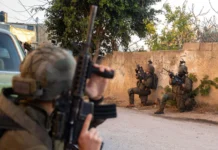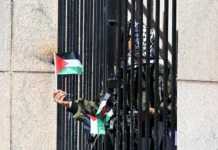There are no changes to current civilian guidelines issued by the Israel Defense Forces Home Front Command, the military said on Thursday amid mounting fears of an Iranian retaliatory attack that could target large population centers and critical infrastructure in the Jewish state.
In a post on X, Israeli military spokesman Rear Adm. Daniel Hagari emphasized to the public that “there is no need to buy generators, store food and withdraw money from ATMs.
“As we have done until today, we will immediately update on any change, in an official and orderly manner,” he added.
On Monday, seven members of Iran’s Islamic Revolutionary Guard Corps, including its leader in Syria and Lebanon, were killed in an attack in Damascus that targeted a building adjacent to the Iranian embassy.
Israel has not officially taken responsibility for the attack, but four officials told The New York Times that Jerusalem ordered the strike.
On Thursday, Iranian Supreme Leader Ayatollah Ali Khamenei threatened Israel in Hebrew, tweeting, “With God’s help, we will make the Zionists repent of their crime of aggression against the Iranian consulate in Damascus.”
Senior sources in the Iranian regime told Reuters that the Islamic Republic would give a “serious response” to the raid, though suggested that Tehran would avoid direct conflict with Israel and the United States.
According to Israeli assessments reported by Channel 12, Iran could attempt to strike Israel through one of its terror proxies—Hezbollah in Lebanon, the Houthis in Yemen or militia forces in Syria.
IDF Intelligence head Maj. Gen. Aharon Haliva stated at an army ceremony on Thursday that “it is not certain that the worst is behind us,” warning his subordinate officers that Israel is to face “complex days.”

‘A multi-front situational assessment’
Fears are exacerbated by a convergence of events set to take place over the next 72 hours, Channel 14 said, noting that Muslims worldwide will this weekend mark the last Friday of Ramadan, Laylat Al-Qadr (“Night of Power”) and Iran’s annual Quds Day (“Jerusalem Day”).
In a statement on Wednesday, Israel’s National Cyber Directorate warned of an increased risk of hacking attacks related to Quds Day, including but not limited to “website defacement, distributed denial-of-service [DDoS] attacks and dissemination of false information.”
The military took the unusual step of canceling weekend leave for combat soldiers. “The IDF is at war, and the deployment of forces is under continuous assessment,” it said on Thursday.
The notice came after the army on Wednesday decided to increase manpower and call up reserve soldiers to the IDF Aerial Defense Array.
“We have strengthened alertness in combat units, bolstered defense systems, and we have planes prepared for defense and ready for attack,” Hagari told reporters on Thursday night. He said troops are ready on “all of the borders” and are prepared “for a variety of scenarios.”
Hagari also confirmed that the military was behind the widely reported GPS disruptions, a defensive measure meant to proactively confuse enemy aerial attacks targeting Israeli territory. The IDF has urged Israelis to manually set their location on the Home Front Command application to continue receiving emergency alerts for their area.
Israeli Defense Minister Yoav Gallant held a “multi-front situational assessment” with senior officials from the defense and military establishment, the Defense Ministry announced on Thursday night. Those who attended included IDF Chief of Staff Lt. Gen. Herzi Halevi; Israel Security Agency (Shin Bet) head Ronen Bar; Mossad director David Barnea; Defense Ministry Director General Eyal Zamir; and other top officials.


























